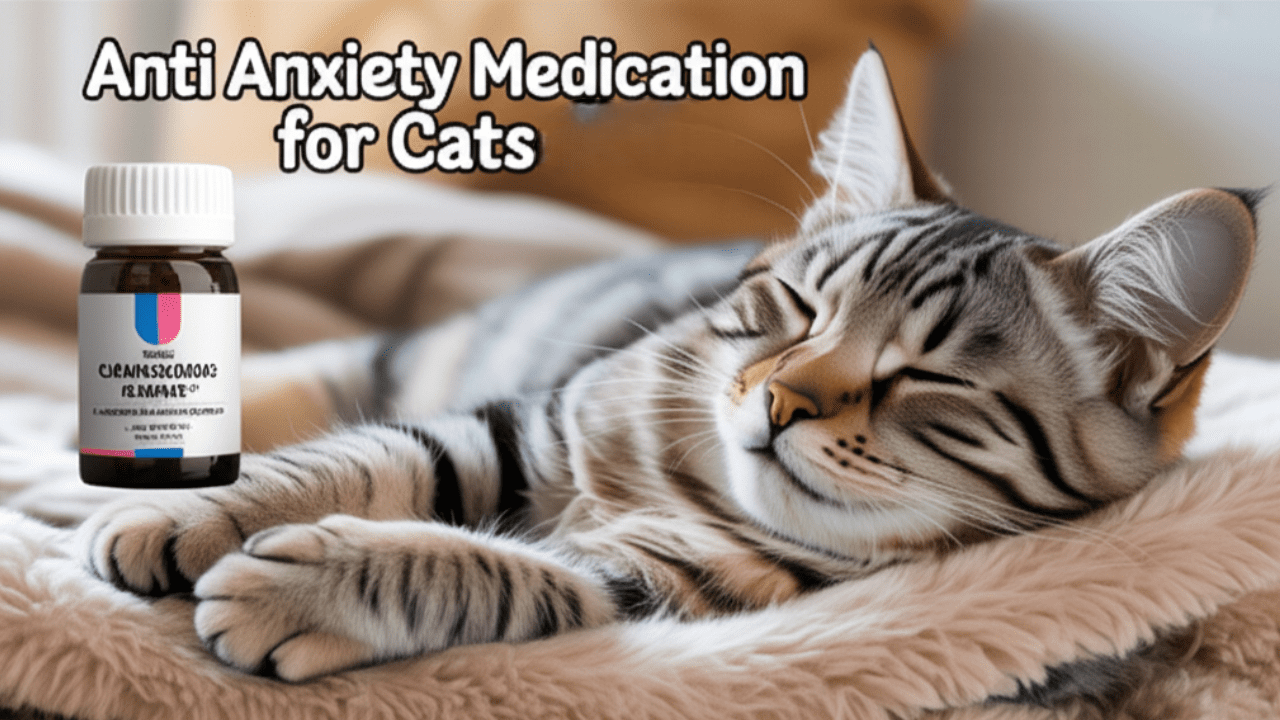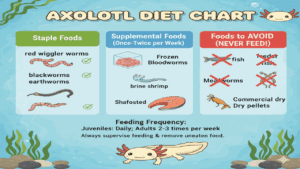Anti Anxiety Medication for Cats (2025 Buyer’s Guide): Vet-Recommended Options, Costs, Delivery Methods, and Mistakes to Avoid
Your usually calm cat has started hiding under furniture, grooming obsessively, or growling at family members. And you’re left wondering whether it’s behavioral, medical, or something deeper. You’re worried (of course you are).
For many cat owners, these are the first signs of anxiety. But the good news? You can find proven anti anxiety medication for cats that helps.
That said, choosing the right one isn’t as simple as grabbing the first calming treat you find online. Some prescriptions like gabapentin work fast and cost as little as $2-5 per dose.
Other long-term options like fluoxetine can take weeks to be effective. Yet, they are ideal for ongoing behavioral issues.
On the other hand, many natural remedies like L-theanine chews or pheromone diffusers work for mild stress. But they may fall short in severe cases.
Many owners waste money mixing treatments or buying low-quality supplements without understanding dosage or safety.
Want to avoid that? Keep reading then. You’re about to get expert-vetted guidance, cost comparisons, and clear answers you won’t find in product reviews alone.
What medication can I give my cat for anxiety?
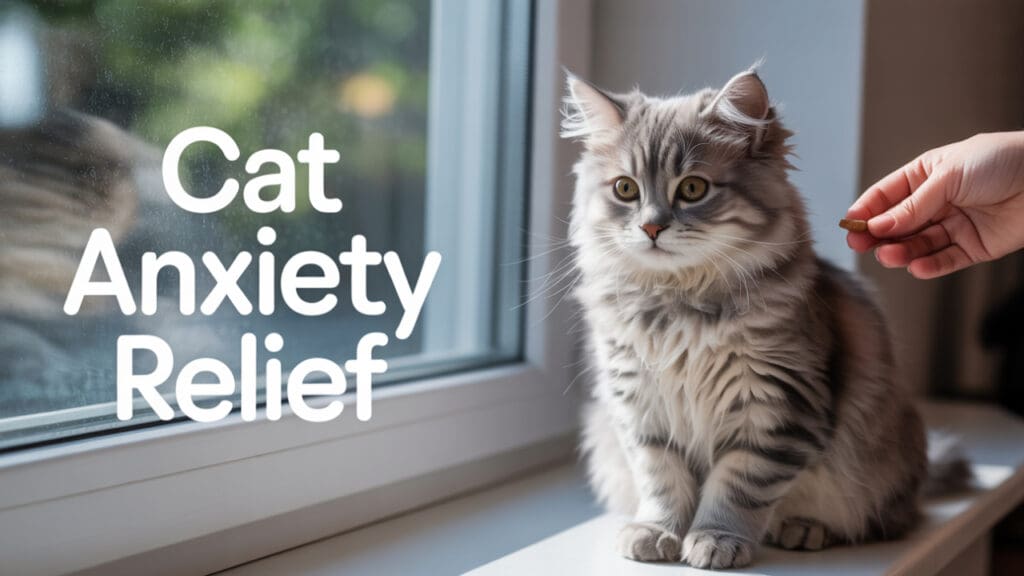
Your cat is showing signs of chronic stress, including hiding, excessive grooming, aggression, or sudden urination outside the litter box. You might be wondering: What can I actually give them to help? You’re definitely not alone in this.
Pet owners across the country are asking this same question as feline anxiety becomes more commonly diagnosed and treated.
There are several effective anti anxiety medications for cats. And they fall into a few main categories: prescription medications, over-the-counter options, and natural remedies.
Let’s start with prescription anti anxiety medication for cats. Fluoxetine (Prozac), gabapentin, and alprazolam (Xanax) are some of the most commonly prescribed medications for chronic feline anxiety.
These drugs help regulate neurotransmitter imbalances that contribute to anxiety-related behaviors. For short-term stress, like vet visits or travel, gabapentin is especially popular because it kicks in fast and is generally well-tolerated.
Here’s something extra that you might find helpful. In Nov 2023, the FDA also approved Bonqat, the first animal-specific pregabalin medication. This offers another fast-acting option for temporary feline anxiety.
That said, it’s important to know that these medications require a veterinary prescription. You should never attempt to administer them without professional guidance.
Now, not all cats respond the same way. Some might experience side effects like drowsiness or digestive upset. Others may show marked improvement within days.
That’s why we recommend a trial-and-adjust approach, starting with the lowest effective dose. And remember, choosing the best anti anxiety medication for cats often depends on their age, medical history, and specific stress triggers.
For owners looking to avoid prescription meds, there are gentler options.
Calming supplements with L-theanine, tryptophan, or CBD are available over-the-counter. And they can be effective for mild anxiety.
Similarly, pheromone sprays and diffusers like Feliway mimic feline calming signals. So they can help reduce tension in multi-cat households.
So, what does this mean for you?
If your cat’s anxiety is disrupting daily life, it’s time to talk to your vet. Whether you pursue prescription medications, over-the-counter aids, or a mix of both, the right treatment can dramatically improve your cat’s quality of life (and certainly yours too).
MEDICATION COMPARISON AT A GLANCE
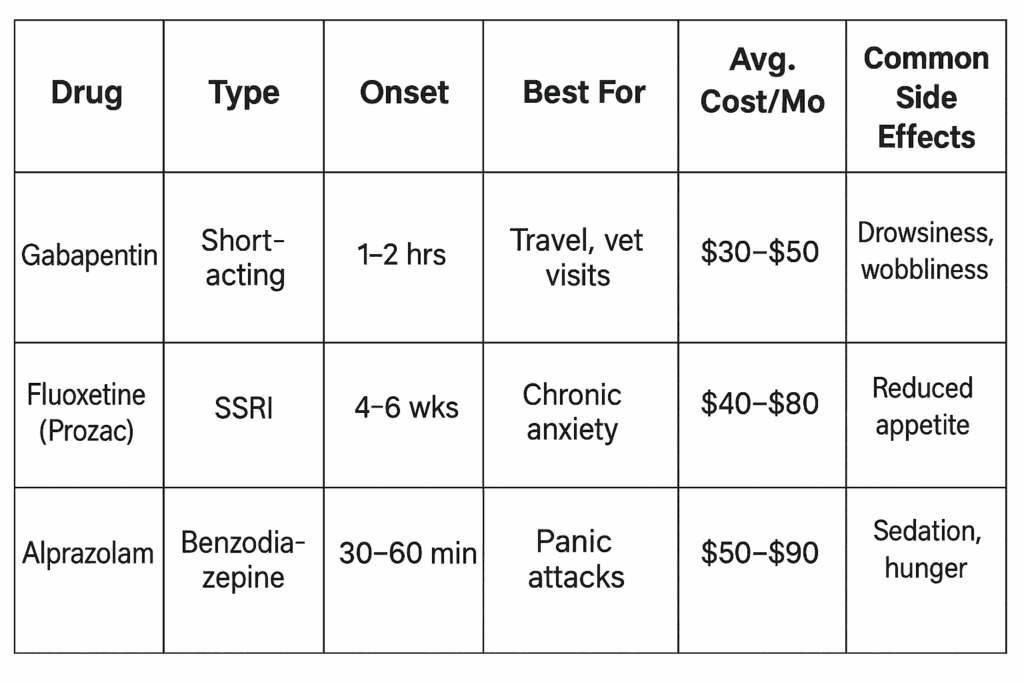
| Drug | Type | Onset | Best For | Avg. Cost/Mo | Common Side Effects |
| Gabapentin | Short-acting | 1-2 hrs | Travel, vet visits | $30-$50 | Drowsiness, wobbliness |
| Fluoxetine (Prozac) | SSRI | 4-6 wks | Chronic anxiety | $40-$80 | Reduced appetite |
| Alprazolam | Benzodiazepine | 30-60 min | Panic attacks | $50-$90 | Sedation, hunger |
Types of Anti Anxiety Medication for Cats: Prescription vs Natural Remedies
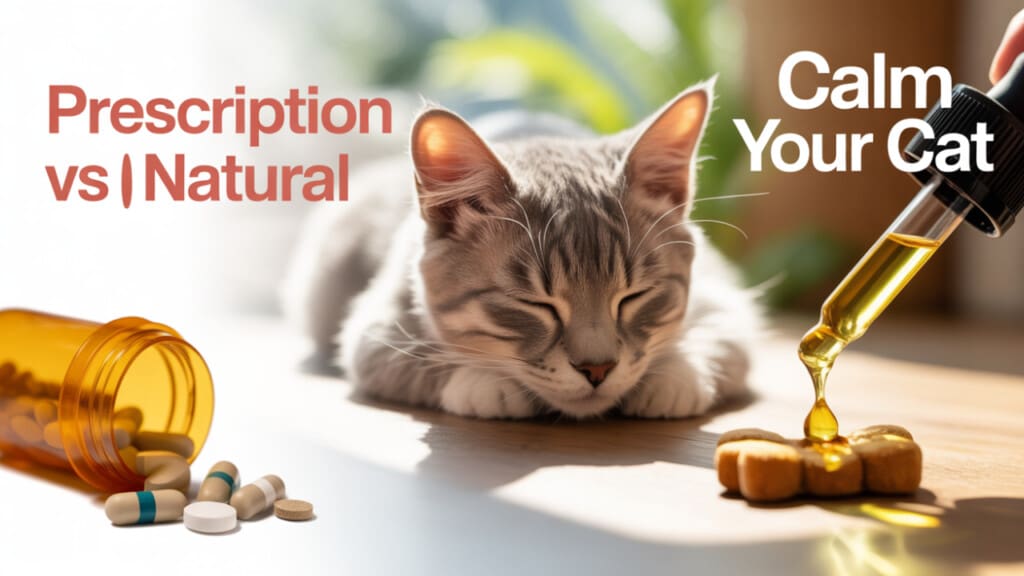
When your cat’s stress turns into destructive behavior or unshakable fear, the first question most pet parents ask is: Should I go the prescription route, or try something more natural first?
Well, you should understand the types of anti anxiety medication for cats first. And you should especially know when to use each to make an informed decision that actually works.
Prescription medications are typically recommended for moderate to severe anxiety or when behavioral modification alone hasn’t helped. Commonly prescribed options include fluoxetine (Prozac), paroxetine, buspirone, and gabapentin.
These drugs work by altering brain chemistry to regulate mood, reduce obsessive behaviors, and ease stress triggers. They are often needed when cats display ongoing anxiety symptoms like aggression, hypervigilance, or compulsive grooming. Most of these require daily dosing and vet monitoring, especially during the adjustment period.
Here’s where cost becomes a factor. Prescription anti anxiety medication for cats can range from $4 to $60 per month. This, of course, depends on dosage, brand, and whether you’re ordering from an online pharmacy or through your vet.
Some medications are available in chewable treats or compounded liquids. These may come at a higher price, but they do offer easier administration.
Natural remedies, on the other hand, are ideal for mild anxiety or as complementary support. These include L-theanine supplements, CBD oil, valerian root, and tryptophan-based chews.
Pheromone diffusers like Feliway emit calming scents that mimic feline facial pheromones. It’s like an instinctual signal of safety for many cats.
While these options are typically more affordable (ranging from $10 to $40 per month), they may not be strong enough for cats with clinical anxiety.
Now, a common mistake cat parents make is assuming that natural equals risk-free or that prescriptions should be a last resort. In reality, many cats benefit from a combination of both (under veterinary guidance, of course).
Choosing between prescription and natural remedies isn’t about right or wrong. It’s about matching your cat’s unique needs with the most effective, humane solution available.
How Safe Are Calming Medications and Supplements for Cats?
If you’ve ever hesitated to give your cat anxiety medication, that sounds like good parenting to us (seriously). Pet owners everywhere worry about side effects, sedation, and long-term impact. And you being aware of this is the first step towards your cat’s health.
So how safe are calming medications and supplements for cats? The answer depends on the type of product, how it’s used, and (most importantly) whether a vet is involved in the decision.
Let’s start with prescription anti anxiety medication for cats. Drugs like gabapentin, alprazolam, or fluoxetine are widely prescribed by veterinarians. They have well-documented safety profiles when dosed correctly.
That said, side effects like drowsiness, lack of coordination, or mild digestive upset can occur, especially during the first few days of use. Vets often recommend starting with a low dose and adjusting as needed.
Note that the biggest safety risk usually comes not from the medications themselves, but from incorrect dosing or unsupervised use.
Over-the-counter calming supplements are generally considered low-risk. Products containing L-theanine, tryptophan, or CBD are popular for managing mild anxiety. They’re non-sedative, naturally sourced, and available in treats, capsules, or liquid form.
However, “natural” doesn’t always mean “harmless.” Cheap supplements lacking quality control may include unlisted ingredients or improper concentrations. You should always (or at least try your best to) choose veterinarian-formulated brands with third-party testing for purity and potency.
One of the most common mistakes cat owners make is mixing products without consulting a vet. Combining prescription meds with herbal supplements or pheromones might seem like a good idea. But it’s often not. This may lead to unexpected reactions or reduced effectiveness.
So, what’s the bottom line? Calming medications and supplements for cats are generally safe when used responsibly and under veterinary guidance.
If you’re unsure which route to take, consult your vet for a treatment plan. Tailor it to help balance safety, cost, and effectiveness for your cat’s unique needs.
Let’s keep reading. We’ll help you sort out the best options for your situation.
Best Anti Anxiety Medication for Cats Based on Symptoms and Use Cases
We’re sure you know by now. Not all anxiety looks the same in cats. And that means not all medications work equally well for every situation.
Whether your feline companion trembles during vet visits, hides during thunderstorms, or lashes out unexpectedly, choosing the best anti anxiety medication for cats depends entirely on the root cause and severity of their symptoms.
For situational anxiety (think travel, car rides, or vet appointments), gabapentin is often the go-to. It acts quickly (within an hour) and is usually well-tolerated. It can also be compounded into flavored liquid or chew form.
Most vets prescribe it as a one-time dose or short-term solution. And it costs roughly $2 to $5 per dose when sourced through pet pharmacies.
If your cat suffers from chronic or generalized anxiety, such as persistent hiding, aggression, or over-grooming, then SSRIs like fluoxetine (Prozac) or tricyclic antidepressants like amitriptyline are typically recommended. These medications work by gradually balancing neurotransmitters over time.
But fair warning. You should expect a ramp-up period of 6–8 weeks before full effects are seen. Monthly costs could range from $15 to $50, depending on dosage and form (pill vs liquid).
Here’s the problem many owners run into. They treat chronic anxiety with short-term solutions (or vice versa). This mismatch can lead to poor results or unnecessary sedation.
Remember, a symptom-based medication plan, rather than a one-size-fits-all approach, is often the key to long-term success.
Do you want something gentler for mild symptoms? Pheromone diffusers, CBD chews, or tryptophan-based treats can help in lower-stress cases. They’re often ideal for newly adopted cats adjusting to a new home or during temporary life changes like moving.
If you’re still not sure which route to take, continue reading. We’ll guide you through what to expect at different price points and how to avoid common buying mistakes that could affect your cat’s health and your wallet.
How Much Does Anti Anxiety Medication Cost for Cats?
You’re about to start your cat on anti anxiety medication. Now, one of your first practical questions is probably: How much is this going to cost me each month?
The answer isn’t one-size-fits-all. But understanding the price range can help you budget wisely and avoid unnecessary surprises at the vet or pharmacy counter.
Let’s start with prescription anti anxiety medication for cats. Common options like gabapentin, fluoxetine (Prozac), and alprazolam generally cost between $15 and $60 per month. It depends on the medication, dosage, and whether it’s generic or brand-name.
For example, a one-time dose of gabapentin for travel or vet visits might cost as little as $2–$5. On the other hand, long-term fluoxetine therapy could cost up to $1–$2 per day. This is especially true if you’re using a compounded liquid or flavored chew.
But don’t fret. Pharmacies that cater to pet prescriptions (like Chewy’s online pharmacy or your vet’s in-house dispensary) often offer subscription discounts or auto-refill savings.
Now, over-the-counter and natural calming supplements may seem cheaper. But know that frequent use can add up quickly.
Calming chews, CBD drops, and pheromone diffusers usually cost $20 to $40 per month, depending on the product and brand.
These options are generally great for mild anxiety. But they may not provide the level of support your cat needs if their symptoms are more severe. This could lead you to spend more over time without the results you hoped for.
This is one costly mistake pet owners make: buying multiple over-the-counter products without guidance, hoping one will “stick.”
It’s not a good idea to explore blindly, really. If you’re saving money, it’s more cost-effective to consult your vet early and get a tailored treatment plan than to trial-and-error your way through the supplement aisle.
So, what does this mean for you? Budgeting for cat anxiety medication doesn’t have to break the bank. But understanding the price range, treatment goals, and dosing frequency is key to making the smartest financial (and feline) decision.
What to Avoid When Buying Cat Anxiety Treatments Online
Shopping online for your cat’s anxiety medication can be fast, convenient, and even budget-friendly. But (as we all know) it’s also a minefield if you’re not careful.
From counterfeit supplements to mislabeled medications, the digital marketplace can be risky if you don’t know what to watch for. So what should you avoid when buying cat anxiety treatments online?
First and foremost, avoid any product that doesn’t list active ingredients clearly. Instant red flag.
Reputable calming medications and supplements, whether they’re prescription anti anxiety medication for cats or over-the-counter remedies, should provide detailed labels with dosing guidelines, ingredients, and manufacturer information.
Vague descriptions or “proprietary blends” without specifics are no good. Stick to well-known, vet-recommended brands whenever possible.
Next, beware of unauthorized or unlicensed online pharmacies. Sites offering steep discounts on prescription drugs without requiring a vet’s approval may be selling expired, diluted, or counterfeit products.
Always look for VIPPS-certified pharmacies (Verified Internet Pharmacy Practice Sites) or platforms that work directly with your veterinarian.
Now, here’s where it gets tricky. You may assume that natural means safe. But not all herbal or CBD products are created equal.
Without third-party testing or vet-formulated dosing, these supplements can be ineffective, or worse, harmful.
One common mistake? Doubling up on supplements and calming treats in hopes of a stronger result. In reality, this can cause lethargy, appetite loss, or GI upset.
Take note. Don’t base your buying decision solely on price or popularity. Just because a calming product has thousands of five-star reviews doesn’t mean it’s right (or even safe) for your cat.
Always cross-reference products with veterinary recommendations or consult your vet directly before purchase.
In short, buying cat anxiety medication online can be safe and smart. That is, as long as you prioritize transparency, regulation, and vet-backed formulations.
Now, let’s keep reading to compare the most popular delivery forms and how to choose the one that best suits your cat’s behavior and stress triggers.
Product Comparison: Pills vs Diffusers vs Chews for Cat Anxiety Relief
Choosing the right format of anti anxiety medication for cats isn’t just about what’s effective. It’s about what your cat will actually tolerate. Some felines despise pills. Others turn up their nose at even the tastiest chews.
So which form of anxiety relief is best: pills, diffusers, or chews? The answer depends on your cat’s stress level, routine, and willingness to cooperate.
Pills, especially prescription options like fluoxetine or alprazolam, are often recommended for moderate to severe anxiety. They offer precise dosing and are backed by strong clinical research.
However, giving a pill to a reluctant cat can be a daily battle. Pill pockets can help, but even then, some cats find ways to avoid ingestion.
These medications tend to cost between $15 and $60 per month, depending on type and dosage.
Chews, including calming treats with L-theanine, tryptophan, or CBD, are a popular over-the-counter option. They’re easy to administer, taste-friendly, and ideal for low to moderate anxiety.
Most brands recommend daily dosing, and a 30-day supply typically runs $20 to $35. But know this. While convenient, chews may not be strong enough for cats with chronic or severe symptoms.
Diffusers like Feliway emit synthetic feline pheromones to create a calming environment. They’re non-invasive, plug-and-play, and great for households with multiple cats.
These work best for generalized stress, like tension between cats, environmental changes, or new pet introductions. A starter kit costs around $25 to $35, with monthly refills averaging $15 to $20.
Remember, many pet parents see the best results using a combo approach. For example, diffusers for background relief, paired with chews or pills during flare-ups.
Still, the most effective method is always the one your cat accepts consistently. Consult your vet to tailor the format to your cat’s behavior. You’ll likely see better long-term results.
Frequently Asked Questions About Cat Anxiety Medication
Cat anxiety isn’t always easy to spot. And treating it often leads to a flood of questions from even the most experienced pet parents.
So, before investing in calming products or prescription treatments, you need reassurance that they’re choosing safe, effective solutions. Here are answers to the most frequently asked questions about cat anxiety medication.
What does anxiety look like in a cat?
Anxious cats may hide, pace, overgroom, urinate outside the litter box, or become unusually vocal or aggressive. This is especially evident during stressful events like loud noises or changes in routine.
What is the best medication for cats with anxiety?
There’s no single best medication. It depends on your cat’s symptoms and health history. That said, vets often recommend fluoxetine (Prozac) for chronic anxiety and gabapentin for situational stress.
Is gabapentin or trazodone better for cats?
Gabapentin is typically used for short-term anxiety like vet visits. Trazodone, on the other hand, is primarily used for situational anxiety (not so much for long-term management). Your vet should determine which suits your cat’s needs best.
Can I give my cat Benadryl for anxiety?
Benadryl isn’t commonly used for feline anxiety. It can cause drowsiness or agitation. And it should only be given under direct veterinary guidance. It’s not considered a long-term solution.
Is there a natural remedy for cat anxiety?
Yes, options include L-theanine, CBD, and pheromone-based products like Feliway. These are often best for mild stress or used alongside behavioral therapy.
How much does anti anxiety medication cost for cats?
Prices vary from $10 to $60 per month. It depends on whether you’re using over-the-counter calming chews or prescription anti anxiety medication for cats like fluoxetine or alprazolam.
Do you need a prescription for cat anxiety medication?
Yes, most medications such as gabapentin and fluoxetine require a vet’s prescription. Calming chews and pheromone products, however, are available over the counter.
Where is the best place to buy anti anxiety medication for cats?
Your vet is the safest option. But trusted online pet pharmacies like Chewy and 1-800-PetMeds also offer prescription fulfillment and vet-verified products.
What are the side effects of cat anxiety medications?
Common side effects include drowsiness, reduced appetite, vomiting, or unsteady movement. These effects are usually mild and subside with time or dosage adjustment.
Can I combine natural and prescription anxiety treatments for my cat?
Yes, many vets recommend a combination approach for better results. But this is only under their supervision to avoid adverse interactions or over-sedation.
What is the first FDA-approved anxiety medication specifically for cats?
The first FDA-approved animal drug specifically for treating anxiety in cats is Bonqat. And it contains pregabalin. Approved in November 2023, Bonqat is used to help relieve short-term stress relief. These include vet visits, travel, or environmental changes. It offers a longer-lasting calming effect compared to gabapentin and must be prescribed by a veterinarian.
Still curious or unsure which path to take? The best next step is a conversation with your vet to tailor the right anxiety solution for your cat’s unique needs and lifestyle.
What’s the Smartest Way to Choose Cat Anxiety Medication?
By now, you’ve seen that managing feline anxiety goes beyond picking the first calming treat you find online.
Whether your cat needs a fast-acting prescription like gabapentin, a long-term solution like fluoxetine, or a natural remedy like L-theanine or pheromone diffusers, the smartest choice depends on your cat’s unique triggers, tolerance, and daily routine.
We’ve unpacked everything, from actual monthly costs to common buyer mistakes. So, you can make a safe, informed decision without second-guessing. At the very least, you should now be better equipped to choose solutions that actually work, not just the ones with pretty packaging.
When in doubt, consult your vet and explore trusted sources. When ready, take the next step. Start comparing safe, vet-recommended options.

